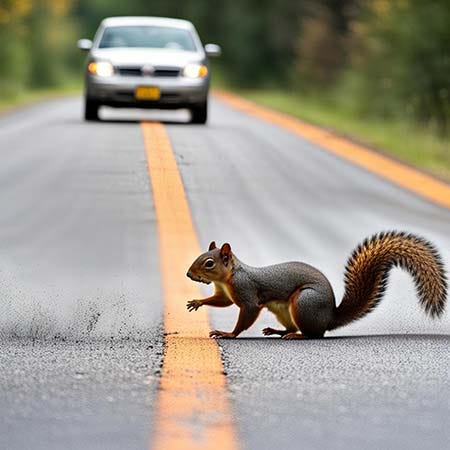More than 60 years of driving back country roads have led me to the conclusion that Henry Ford had a significant impact on the squirrel gene pool. Over the past few years I’ve been casually making observations to confirm my theory.:
While my study has been anything but scientific, and the results are hardly ground shaking, I thought I would publish here at Lou’s Joint, where all the great thinkers congregate. I feel confident enough to voice it now, and hope that others will chime in and either confirm or refute my conclusions. I it doesn’t get me the Nobel Prize, I’ll happily settle for your approval. My line of thinking goes something like this:
Henry Ford's Model T, and more specifically the development of the assembly line for automobiles, made cars available to the masses. This led to a chain reaction of events, including an explosion in the number of cars on the road, improvement of roads, increases in speed and horsepower, and an undeclared and not unnoticed war on squirrels and other critters, including chickens crossing the road. The latter was particularly noticeable in the Vineland area where I grew up.
The term "roadkill" entered our vocabulary, as did the term "nutty as a squirrel." It seems obvious that the latter term came into being because of squirrels' love for acorns and the way they behave while trying to cross the road to avoid oncoming traffic. Their indecisive back-and-forth method of getting to the other side became the butt of many a joke, and if squirrels had a lobby, they would probably be seeking more politically correct terms.
Think about it for a minute and pay close attention the next time you see a squirrel on the side of the road. I've noticed that a good number of squirrels make it across the road without the expected back-and-forth, back-and-forth, back-and-forth. In fact, a significant number of them make it in almost a single dash.
Once upon a time, the squirrel population was dominated by squirrels with genes that caused indecisive road crossing. In terms of evolution, zig-zagging works better for escaping predators than for escaping an oncoming car. However, a small number of squirrels lacked this zig-zag gene and, when crossing the road, did it in a more decisive manner. As indecisive squirrels became roadkill, the decisive squirrel population grew. Today, there are enough decisive squirrels in the population for us to take notice.
It's a case of survival of the fittest and natural selection, though automobiles are hardly forces of nature. They're actually more akin to the evolution of the peppered moth.
Now, before you start ridiculing my theory, I know that this is a gross oversimplification of natural selection, and much of it is written in jest. However, I ask you to think about this the next time you see a squirrel trying to cross the road. Is my observation about their behavior accurate, or am I as nutty as our furry friends?
On second thought, just answer the former question. If you know me, you already know the answer to the latter.
About The Author: Now retired, Art Wolinsky spent 30 years of teaching and 20 years of techn
ology staff development experience in his consulting role with school districts. He was the educational technology director of the WiredSafety.org and the Online Internet Institute, a member of the Big6 Academy, and author of the Internet Library, a six book series for students.
NOTE: Art is our first guest writer. If you would like your work to be included on our prestigious site, our requirements are your post needs to be between 500 & 1500 words long and no bigoted or obscene content. You can include a direct link to your website or blog. Just submit it to me at loumas77@gmail.com. I reserve the right to edit with your approval.





